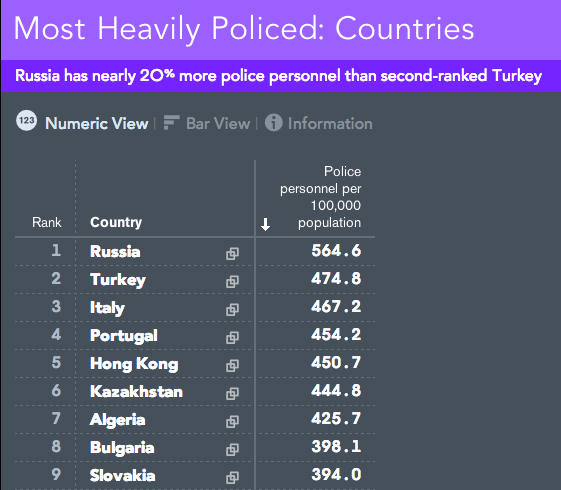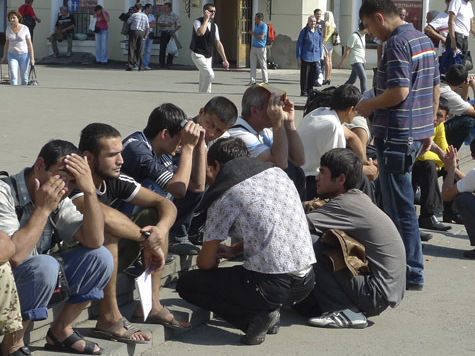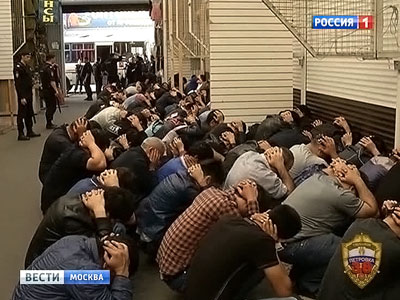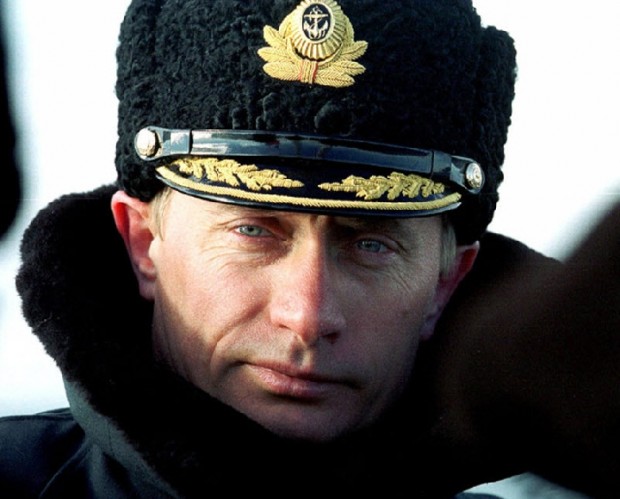Opposition leader Alexei Navalny has posted a blog post about the race riots that occurred over the weekend in Moscow. On October 12, a Russian man was murdered by an immigrant, sparking race riots in the southern district of Biryulyovo. The narrative of what happened during the riots can be read here, and an analysis of the back story of the racial tensions in Russia can be read here.
Alexei Navalny has been extremely outspoken about the need to institute stricter immigration controls. Navalny has identified with the Russian nationalism movement in the past, and has been accused by some of being a racist, accusations which he addressed during the mayoral campaign. In the wake of the riots, Margarita Simonyan, editor-in-chief of the Kremlin-owned RT (formerly Russia Today), accused Navalny of fanning the flames of ethnic violence, and a closer look at some of his tweets suggests that he didn’t shy away from controversial material, but he also never directly called for violence. Some have suggested that the blog post we’ve translated below also contains racist material and openly endorses the rioting.
The text of the blog post, however, is much less clear. Navalny expresses opinions below which are not uncommon, and some of which are supported by the facts. For instance, Yuri Luzhkov, a former mayor of Moscow, has also made statements calling for new immigration laws, a visa regime, and a crackdown against crime and unsafe living conditions that can commonly be found in Moscow and in other Russian cities. Luzhkov said that the rioting was understandable, that authorities have allowed the situation to get this bad, and that police and government officials were turning a blind eye to some of these migrant camps because of a culture of corruption — in other words, there was profit to be made, through bribes and the employment of virtually-slave labor, and so the status quo has been allowed to subsist. These statements were published in the Kremlin mouthpiece Izvestia, not on an opposition blog post.
There are significant reasons to be concerned about anti-immigrant pogroms and rampant and racist Russian nationalism. Luzhkov notes this as well (Navalny does not, though he suggests that the government needs to fix the situation before the people are forced to fix it using “primitive” methods). The reality is that there may be two different epidemics in Moscow right now: racism, and an intolerable system of migration.
There are also signs that the only way the Russian government will act to fix immigration problems occurs when people threaten force. A perfect illustration of this occured over the summer in St. Petersburg, when police began to detain migrant workers only after Russian Neo-Nazis conducted a pogrom in a marketplace. Police could be seen taking orders from the Neo-Nazis. Also over the summer, growing racial tensions led police to raid immigrant workplaces, which resulted in the construction of internment camps for “slaves” who had been working in plain sight, some of them for years. And just this week, after the race riots, Moscow police raided the migrant camps in the Biryulyovo district that was attacked and arrested 1200 migrants. The message being sent from the authorities is clear: there is an immigrant problem, but the government won’t fix it unless they are forced to.
All emphasis (bold, italics) is Navalny’s- Ed.
If you yourself don’t live in Biryulyovo, then it is much easier for your to understand the reasons for the events on 13 October if you go here.
This is Wikimapia, a site where users can comment on various geographical features.
So here is the commentary [for the Biryulyovo vegetable warehouse]:
2 years ago:
On the whole, this facility has become a giant problem – the warehouse is teeming with illegals, many live in the district, and make their living at night by robberies. Such facilities should be watched more carefully and placed outside of Moscow!
2 years ago:
Yes, in fact, I also remember lessons in Basic Life Safety on ammonia at the vegetable warehouse (I also studied at no. 1242)…Really, there are plenty of illegals, but it seems to me that if this warehouse were to disappear suddenly, the illegals would hardly noticeably be reduced since they work in many areas of small business in Biryulyovo, which is very stupid from a sanitary and hygienic perspective. Although, of course, the most uncivilized of them (those who are camping out in the area of the vacant lot 600 meters to the east) will leave or spend the night in another district where there is something like Cherkizon [a large marketplace—Ed].
2 years ago:
Well, besides oversight of the warehouse, the authorities should look after the housing stock—WHO really lives in the homes in Biryulyovo, and how many are living in one apartment, only no one needs this as it is a source of income for officials.
5 months ago:
Well, that’s it, the end of the district. Until ‘42 a bunch of snakes, the hope is only for a radical change of government, but in Russia this is entirely expected
5 months ago:
A rare hotbed. Source of unsanitary and illegal migrants. Dealers come for goods here even from neighboring regions. It has reached the point that Vietnamese citizens buy as many vegetables as they can fit on a few handcarts, and then go around with them on the commuter trains to Kursk packed to the gills (the Red Construction platform is nearby) and try to sell their wares.
To me, as a resident of Maryino, I’m sorry, it’s extremely clear what’s going on there. I also have a “Garden Market” close by, where a large part of the Cherkizona Market was moved, a strange territory not under the authorities’ control which is expressed in everything – from the eternal traffic jam to the illegally parked cars to, naturally, the horde of legal and illegal migrants who live in nightmarish conditions there as well.
Those who can’t find a spot at the market rent apartments in the nearby buildings where they live in groups of up to 20 people.
From there, they commit raids on the nearby districts; they aren’t going to die of starvation if they don’t find work. One can grab a purse in the metro, one can take somebody’s money away in the elevator with a knife.
Even the non-criminal, but expected consequences of a concentration of migrants, like 50% of the children not being able to speak Russian in the nearby schools, you can understand, does not provoke joy in the “natives.”
Understandably, a place that is a nightmare for the local residents is a wonderful Field of Miracles for the police, the FSB, the Board and the Prefecture. Cash is loaded up there by the suitcase-full.
Here is a typical aggravation: More Than 1,000 Detained at Moscow Garden Market.
And?
Did they close the Garden market? Did they deport those thousand people? Did they disqualify any of those “entrepreneurial employers”?
Of course not, they paid a thousand rubles each to the police chief for each one, and took the money to their “curators” at the Mayor’s Offices and the FSB.Everything goes on as before.
Any resident of the Lyublino district will tell you the same thing about the Moskva shopping center there.
You have to understand that the more nightmare is brought into the lives of local residents in a place of concentrated housing of migrants, the more the siloviki [power ministers] and local authorities can earn money.
That’s the law.
They all know: a criminal ghetto has been created there, people from there commit crimes with impunity, because they pay the government bribes. The government is for them and against us. That is also the law.
No justice can be obtained in court or at the police. And that is also the law.
So against these laws known to everyone in Moscow and Russia, the residents of Biryulyovo demonstrated yesterday, and tried to organize a lynch mob from anger, helplessness and understanding and realization that “if there isn’t going to be a shake-down, then no one will pay attention.”
The context of the crime: he stood up for his girl, and got a knife in the back whipped up the emotions to the extreme.
Therefore, you can spout any nonsense now about incitement by extremists, about the raging of nationalism and so on. Everyone gets it all. If there is no fair system to resolve conflicts and problems, then people will create them themselves, in a primitive and wild fashion. That is to be expected: after all, they are the ones being murdered.
Look at what the “law-enforcement system” has become: a) OMON, breaking up protests, b) the Investigative Committee, fabricating criminal cases to order not just in the course of work but as its only occupation, c) the FSB whose leadership is occupied exclusively with finding jobs for their kids in state banks.
All of this system gobbles up a third of the budget – there’s no point to it.
Russia is a super-champion when it comes to the number of policemen per capita.

But ask anyone, whether in Biryulyovo, or on Rublyovka: can the law-enforcement system catch criminals?
The answer is obvious.
Now I am writing this post, sitting at my latest court trial, where we are filing a complaint against a fake criminal case against “the Navalny Brothers.” The investigative group is made up of 12 people; several of them are special cases investigators.
A brigade of FSB agents have been attached to the investigative group, who are conducting searches, seizures, wire-tapping and so on all over the country.
If a quarter of these resources were deployed to search for the murder of 25-year-old Yegor Shcherbakov, murdered in Biryulyovo (even if only after the actions to organize the “people’s assembly” began), then there would have been no disorders.
Until reform of the law-enforcement agencies will be made in Russia as well as reform of the courts, creating conditions for their independent professional work, events like those in Biryulyovo will repeat themselves.
That’s fundamental thing number one.
Then, fundamental thing number two.
The main culprit for the riots in Biryulyovo is here:
It is this actor who imagines himself to be a builder of empires, who continues to spout delirious nonsense about the fact that introducing visas for the countries of Central Asia and the Caucasus “will drive the former republics of the USSR away from us”.
During a press conference on the outcomes of the Asia-Pacific Economic Conference, Russian President Vladimir Putin put an end, at least for the near future, to speculation about the introduction of a visa regime with a number of countries of the CIS.
“A visa regime within the CIS would mean that we are pushing the former republics of the Soviet Union away from us. We need not to push them away but bring them closer,” Interfax quoted Putin as saying.
84% of citizens want to introduce this visa regime. This is the demand of the whole population.
Paradoxically, those very “illegal migrants” about which everyone writes just don’t exist. They are all legal.
There is no visa regime in Russia and you can come and go even without a foreign passport.
Russia must have a clear and precise policy in this area: 1) we are trying to reduce the number of migrants; 2) we are introducing a visa regime; 3) we are implementing a strategy to increase labor productivity; 4) only highly-qualified workers can freely come here; 5) we are fighting against the emergence of ethnic ghettos with all our might (such as at that vegetable warehouse).
Unfortunately, it is not hard to predict that we will not hear anything from the government except the usual babbling, where they will try to cover up the emptiness of the content with words like “tough,” “immediate” and “decisive.”
How can I not quote here the note from five months ago in the description of the vegetable warehouse: the hope is only for a radical change of government.
P.S.
Do you want to directly indicate your political position regarding the need to introduce a visa regime with the countries of Central Asia and the Caucasus? Then support the law drafted on this issue by the Anti-Corruption Foundation.


